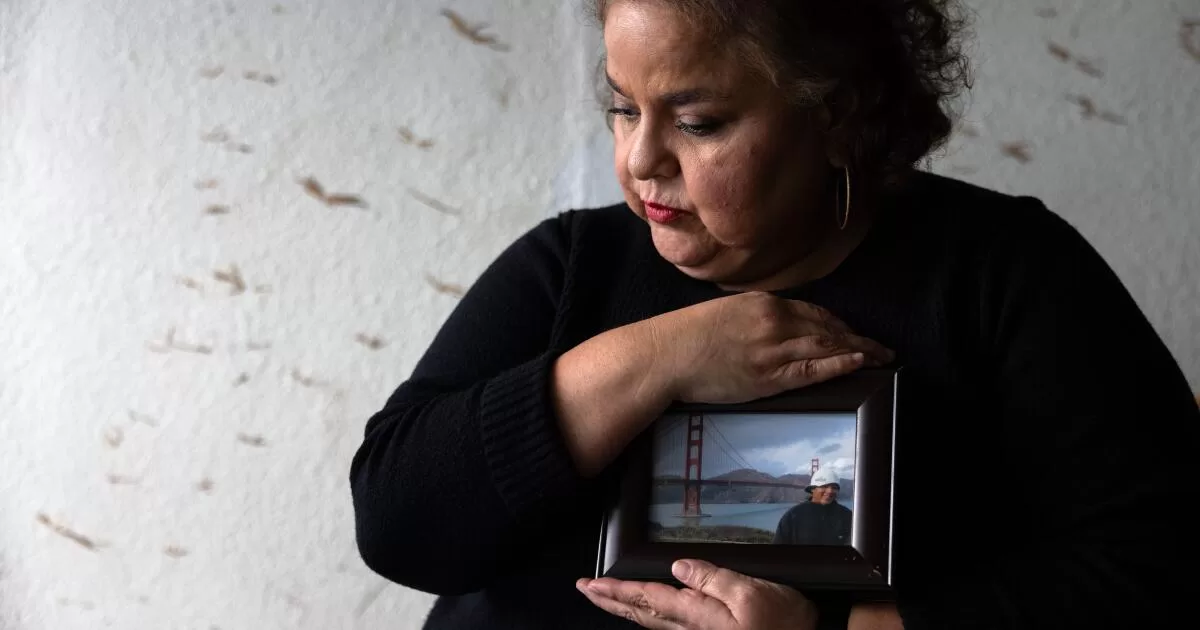Ahead of that hearing, a dozen other U.S. citizens submitted statements Thursday detailing how their lives were similarly devastated by consular visa denials. Lawyers think thousands of families could be in similar situations.
Luis Acensio Cordero was denied a visa to return to the U.S. from El Salvador and has been separated from his wife, Sandra Muñoz, since 2015. The couple sued, arguing the federal government had violated her constitutional right to marriage and due process by denying Acensio’s visa without providing a timely explanation.
Biden administration lawyers have argued that Muñoz’s right to marriage has not been violated because she and Acensio could live outside the U.S.
The high court will consider whether the refusal of a visa to a U.S. citizen’s noncitizen spouse “impinges upon a constitutionally protected interest of the citizen,” and, if so, whether notifying a visa applicant that they were deemed inadmissible suffices as due process.
If the court sides with Muñoz, other families could be entitled to some explanation about why they were denied visas.
Her attorneys fear that if the court sides with the Biden administration, former President Trump, if reelected, would use the authority to justify blanket bans once again of people from certain countries.
Members of Congress, former Department of Homeland Security officials and former consular officers were among the dozens of parties who submitted friend of the court briefs in support of Muñoz and Acensio and who called on the court to uphold basic due process protections.
“The overwhelming majority of visa adjudications involve the exercise of individual consular officers’ often wide discretion, reflecting their own personal opinions and biases, within the framework of the statute or regulation they are implementing,” wrote eight former consular officers including David Strashnoy, who served in Mexico and Russia from 2006 to 2015. “While most consular officers exercise their discretion reasonably, sometimes consular officers’ decisions to deny visas are arbitrary and capricious, based on misinformation or misunderstandings, or grounded in stereotypes.
“Some judicial oversight is therefore needed, at least when a visa refusal implicates the fundamental interests of Americans,” they wrote.
Thirty-five House Democrats, led by Reps. Pramila Jayapal (D-Wash.) and Linda T. Sánchez (D-Whittier), argued that advocating on behalf of their constituents — a core function of Congress — is impossible when agencies refuse to provide information about why a visa application was denied.
Years ago, Rep. Judy Chu (D-Monterey Park) requested detailed reasoning from the State Department about Acensio’s denial but was given none, “rendering the representative unable to assist her constituents,” the brief states. After the couple sued, they found out the federal government believed he was an MS-13 gang member, based in part on a review of his tattoos.
The immigrant advocacy nonprofits International Refugee Assistance Project and American Families United collected the stories of other families in similar situations and summarized them in a brief submitted to the court Thursday.
The cases include others who were denied visas after consular officers questioned the significance of their tattoos, couples who had been forced to live abroad in countries the U.S. considers dangerous and immigrant spouses who chose to enter the U.S. illegally to reunite with their family and now fear deportation. One man who was denied a visa was later targeted by gangs and police in El Salvador, fled to the U.S. and was released on bond while he pursues asylum.
The families included in the brief “were eager for the Supreme Court to have the information before them so they can understand it’s not just the Muñoz family,” said Melissa Keaney, an attorney with the International Refugee Assistance Project.
“Not only do they have the denials of these visas, but they have no real sense of why,” she said. “They’re just left to guess, and that really compounds the frustration and trauma that they experience from the denial.”
Among the examples is Ms. F, a U.S. citizen who fled Taliban-controlled Afghanistan with her family as a child and grew up in California. She met her husband, Mr. R, while visiting extended family in Afghanistan in 2010. The couple were identified in court filings by their first initials to protect their privacy.
Because her husband was unable to secure a visa, she visited him throughout the years and returned to the U.S. to give birth to their children. Ms. F was in Afghanistan when the Taliban retook control of the country in 2021. Her family was evacuated but held at a U.S. military base in Kosovo for nearly a year before her husband’s visa was denied on security grounds without further explanation.
The court brief also mentioned Sloane Arias of Los Angeles and her husband, Otto Sandoval-Gonzalez, who was born in El Salvador. Like Muñoz and Acensio, the couple went to El Salvador for Sandoval-Gonzalez’s consular interview and he was questioned extensively about whether he had any gang affiliation. He was denied a U.S. visa on security grounds without further explanation.
Arias returned to the U.S. without her husband, moved in with her parents due to the resulting financial strain and sees him only occasionally, when she can save enough money and take time off work. She now suffers from depression and worries they will never be able to start a family.
